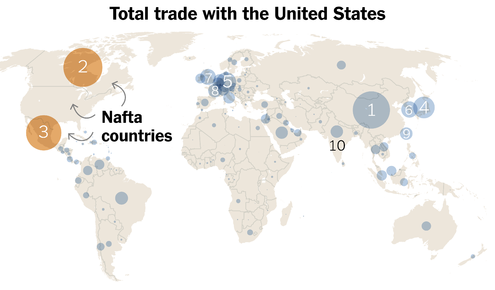While trade with Canada has been more balanced in recent years, Mr. Lighthizer said Wednesday that over time the United States has run a significant trade deficit with Canada, too.
Such trade deficits, Mr. Lighthizer said, “can’t continue.” President Trump has made it clear that he regards trade deficits as a primary measure of the nation’s economic health.
Mexico and Canada, however, are united in discounting the importance of trade deficits. Many economists agree that the focus on bilateral trade is misplaced. A nation may run a deficit with one trading partner and a surplus with another. What matters is the totality.
“Canada doesn’t view trade surpluses or deficits as a primary measure of whether trade works,” Chrystia Freeland, Canada’s minister of foreign affairs, said on Wednesday.
Graphic
How Nafta Changed U.S. Trade With Canada and Mexico
Trade has contributed to economic growth, but changing dynamics have also prompted concerns about lost jobs and the trade deficit. But when something is manufactured in the United States, it is often made up of parts from around the world.

Mexico has been even more pointed in resisting the assertion that there is a problem. The economy minister, Ildefonso Guajardo Villarreal, told a Mexican Senate commission last week that he was “delighted to analyze the situation that we call ‘trade rebalancing’ if and when we manage to improve that through expanding trade, not restricting it.”
A key question looming over the negotiations is how the Trump administration’s public bombast will translate into the details of the negotiations. The administration in its early months has repeatedly talked tough and then sought to conciliate trading partners.
The administration, for example, insists that it wants to do away with a system of independent arbitration that allows companies to seek the elimination of tariffs. The system has been used primarily by Mexican and Canadian companies to force the United States to abandon protectionist measures found to be in violation of the agreement.
Advertisement
Continue reading the main story
Another area of potential conflict concerns the automobile industry. The United States wants to discourage importation of auto parts from countries outside the Nafta region. Under the current agreement, a car assembled in Mexico can be imported into the United States without paying an import tax if at least 62.5 percent of the car, measured by value, was made in North America. The Trump administration wants to raise that bar, and to require that a significant portion of those parts come from the United States.
The United Automobile Workers union has long sought such a change.
But carmakers are wary. The importation of some cheap parts helps to hold down the cost of the final product. In general, a higher share of Nafta components, and a higher share of American components, means a more expensive car.
“Many in the business community feel that the Nafta is working quite well and they don’t want disruption in existing supply chains,” said Jeffrey J. Schott, a Nafta expert at the Peterson Institute for International Economics in Washington. Both Canada and Mexico said Wednesday that they opposed specific standards for the share of car parts coming from any of the three nations.
There is general agreement among the three nations that Nafta needs to be modernized. It was written before the advent of Internet-based commerce, for example, and there is broad support for stronger enforcement of workplace and environmental protections. Indeed, the three nations already renegotiated Nafta once as part of the discarded Trans-Pacific Partnership agreement.
Some issues appear relatively straightforward. The Trump administration is eager to insert provisions addressing currency manipulation. Canada and Mexico float their currencies, and are unlikely to resist the symbolic gesture.
But on more substantive issues, both Canada and Mexico have shown a growing willingness to resist American demands.
Luis de la Calle, a former Nafta trade negotiator for Mexico, said the shock value of Mr. Trump’s bluster and threats had diminished since the presidential election. “Most people thought back then that he had powers to impose duties, close the border, prevent investment,” Mr. de la Calle said. “Now people have learned what trade experts knew all along, that he doesn’t have those powers.”
Mr. Trump also will need to win congressional support for a revised agreement. Democrats, who have long sought changes to Nafta, share many of his stated goals, but Mr. Trump’s political problems could complicate any alliance.
Advertisement
Continue reading the main story
There is also little if any congressional support for the administration’s threat to withdraw from the trade agreement if Canada and Mexico resist improvements.
Representative Tim Ryan, an Ohio Democrat, said Tuesday that “being bombastic” was not “the mature way” to seek changes. “Ultimately you can have huge disruptions in the economy if you don’t handle this like an adult,” he said.
Ms. Freeland spoke first on Wednesday, and began by holding up pictures of American and Canadian firefighters working together, images that she said “illustrate the deep friendship that our countries share.”
Mr. Guajardo Villarreal struck a similar tone. “Nafta has been more than a trade agreement,” he said. “It has made us think of ourselves as a region.”
Mr. Lighthizer began by acknowledging that Nafta had benefited groups including American farmers and communities along the Mexican border.
Then he insisted that the agreement was broadly damaging to the United States, causing the loss of hundreds of thousands of jobs.
“The views of the president about Nafta, which I completely share, are well known,” Mr. Lighthizer said. “I want to be clear that he is not interested in a mere tweaking of a few provisions and a couple of updated chapters.”
He concluded, “And now, we will get down to work.”
Continue reading the main story
Article source: https://www.nytimes.com/2017/08/16/business/economy/nafta-negotiations-canada-mexico.html?partner=rss&emc=rss
Speak Your Mind
You must be logged in to post a comment.